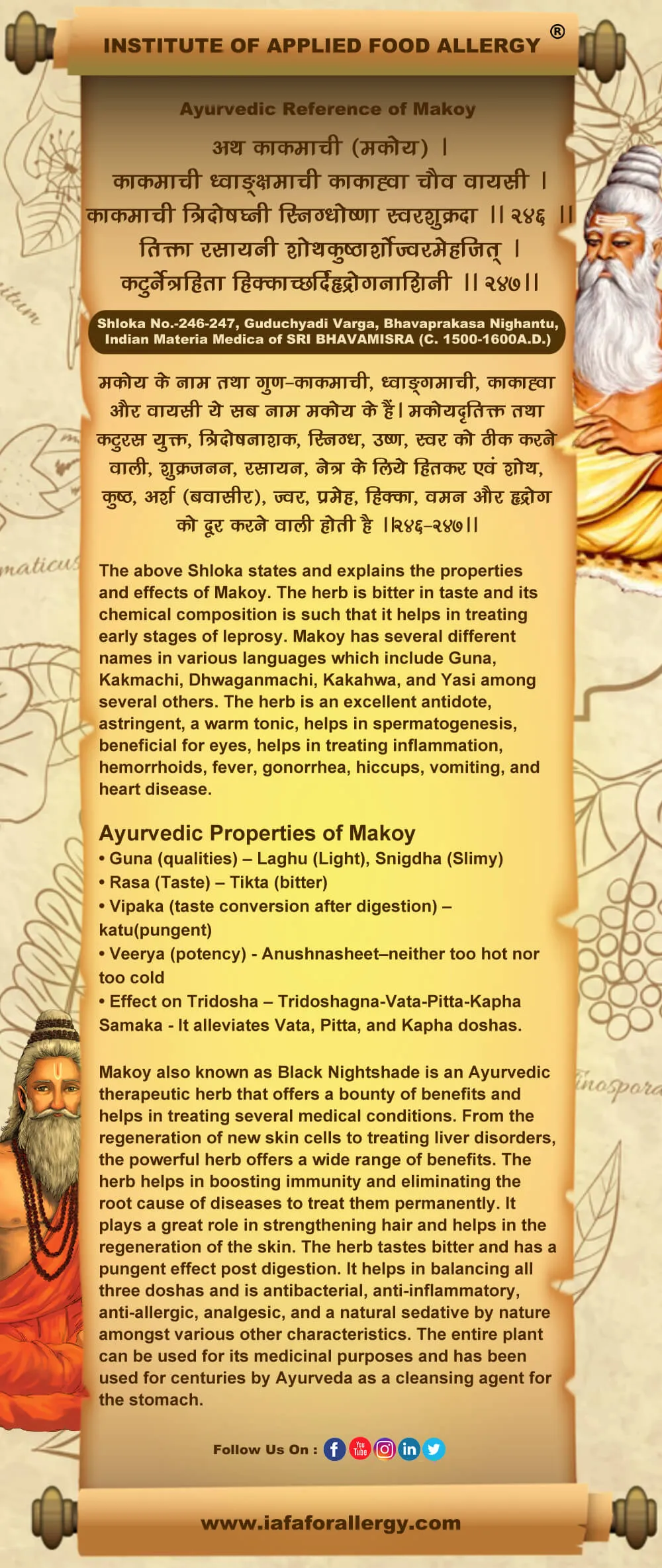On This Page
Makoy (Solanum nigrum) – Uses, Benefits, and Medicinal Properties
Introduction
Makoy, scientifically known as Solanum Nigrum is observed by Ayurveda as a wonder herb because of its numerous medical and health benefits. It is commonly known as Black Nightshade. Its chief health benefits include:-
- Ability to provide relief against pain and inflammation,
- Analgesic in nature,
- An expectorant,
- A natural sedative,
- Possesses diaphoretic properties,
- Helps in treating skin problems such as itching, burning, and pain.
These are the benefits of Makoy in a nutshell. Further in this article, the uses and benefits shall be elaborated and discussed along with the dosage, various names in different and regional languages, parts of the plant used for medicinal purposes, its medicinal properties, and its phytomorphology and phytogeography which impart the herb its distinctive properties.
Importance of Makoy in Allergies
According to Ayurveda, Makoy ark is recommended as a Rasayan, which possesses anti-allergic properties. Besides this, the antimicrobial properties and antioxidants present in Makoy make it an excellent remedy for treating various kinds of skin allergies. It initiates the regeneration of new skin cells that helps in treating the underlying cause of various skin allergies by replacing the old, dead, and infected cells. It also helps in treating acne troubles, burns, pains, and several other skin problems.
A paste can be applied over the affected or allergic area by grinding the leaves, and allergies of the face can be treated by applying a face mask.
Vernacular Names
| Sanskrit Names | Kakamachi, Kakahva |
| English Names | Garden Nightshade, Common Nightshade, Pretty Morel |
| Hindi Name | Makoy, Makoi, Makoye |
| Kannada Names | Ganikegida, Ganike, Ganikayeagida |
| Marathi Name | Kamoni |
| Telugu Name | Kamanchi, Kanchi Ponda |
| Tamil Names | Manaththakkali, Manarthakkali |
| Urdu Names | Mako, Makoh |
| Punjabi Name | Mako |
Botanical Name
Solanum Nigrum
Sanskrit Synonyms
- Kustagni: Treats skin diseases
- Bahtikkta, Sarvatikkta: Fruits that taste bitter
- Bahuphala: Has many fruits
- Gucchaphala: Clustered fruits.
- Vayasi, Kakahva, Kakamachi: Fruits liked by crows.
Phytomorphology of Makoy
Makoy belongs to the Solanaceae family and is a short perennial herb that grows as a weed in dry areas. The plant grows alternate and egg-shaped 1.6-3.0 inches long and 1 to 2 inches wide leaves that bear cream, white, and violet clustered flowers with bright yellow anthers. The plant is a small and erect 12-47 inches herb that is delicate in nature because of its smooth and soft stems and branches.
The fruits and berries of the shrub turn purplish-black in color when ripe and are 6-8 mm in size.
Ayurvedic Reference of Makoy

Phytogeography of Makoy
The herb is commonly found in drier regions of India and is normally cultivated on roadsides and gardens. The plan is native to Eurasia and is also cultivated in temperate regions of Asia, Japan, Africa, and Europe.
Phytoconstituents of Makoy
The composition of every 100gms of Makoy consists of 82.1% moisture, 8.9% carbohydrates, 5.9% protein, 2.1% minerals, and 1% fat. Amongst the vitamins and minerals, calcium, iron, niacin, Vitamin C, and phosphorus are found in the herb.
The chemical composition of Makoy consists of gallic acid, rutin, epicatechin, naringenin, alpha, solasonine, diosgenin, sapogenin, Steroidal alkaloid glycosides, etc.
Parts Used of Makoy
The whole plant may be used for its medicinal properties including berries, fruits, flowers, and leaves.
Dosage of Makoy
The dosage of Solanum Nigrum depends on certain factors, such as:
- Age
- Health
- Body type
- Medical condition
Before using or consuming any ayurvedic herbs or medicines, it is always advised to consult your healthcare provider. Since there is a lack of adequate scientific information regarding the dosage of makoy, it is best to refer to your pharmacist, physician, or Ayurveda expert before using Makoy.
Chief Characteristics of Makoy
Toxicity is one of the chief characteristics of Makoy as it is extremely poisonous in nature. For this reason, it is not recommended to be used in the pediatric age group. The leaves of the plant have a strong purgative or cleansing power, which is when consumed it stimulates a strong sweating response, promoting perspiration and thus maintaining body temperature.
Also note that if used in excess, it can be fatal and also lead to diarrhea, vomiting, convulsion, and even paralysis attack.

Have A Health Issue?
Consult Online
- Dr. Sahil Gupta (B.A.M.S., M.H.A.)
Ayurvedic Allergy Specialist
CEO & Founder of IAFA®
Tradition Ayurvedic Benefits of Makoy
- Hrudya – A cardiac tonic
- Vrushya – Improves vigor
- Rasayani – Rejuvenates cells and tissue, anti-aging agent.
- Svarya – Improves voice quality and tone
- Sara – Relieves constipation.
- Netrahita – Improves eyesight
- Shukrada – Improves the quality of sperm
Other Benefits and Uses of Makoy
- A poultice of leaves helps in relieving joint pains.
- Ear pain can be treated by ear drops prepared from the juice of Makoy leaves
- 10-20 ml decoction prepared by boiling water with Makoy roots helps in treating insomnia.
- Chewing 5-6 Makoy leaves can be instrumental in treating stomatitis that causes inflammation in the mouth.
- To aid skin diseases, a paste may be prepared with Makoy leaves and must be applied over the affected area.
- Juice from the fresh leaves of the plant helps in treating stomach ulcers.
- Berries of the herb promote respiratory health.
- The juice of the herb helps in treating fever and eliminates pain.
- Juice also helps in relieving menstrual cramps.
- Rubbing seeds of the fruit help in removing freckles.
- Helps in treating rat bites.
- An antidote against opium poisoning.
- Strengthens hair roots and hair color.
- Helps in treating certain gum diseases and also treats bad breath.
- Wounds and cancerous sores can be treated with a decoction of roots, stalks, and leaves.
- Helps in resolving various liver disorders.
- Helps in overcoming panic and stress.
- Helps in treating UTIs.
- Helps in the prevention of jaundice.
Makoy when taken in a prescribed quantity can be a boon to treat various health conditions. The only challenge is the dosage as one needs to be very careful with the amount of herb being used as it may lead to a range of side effects if taken in excess. Therefore make sure you reach out to an expert before relying on the medicinal properties of the herb to treat various conditions.
For this purpose, you can reach out to us at IAFA®, where we aim to provide personalized consultancy to treat health conditions, allergies, and disorders using Ayurveda and the huge array of treatment measures it offers which are absolutely natural and free from any side effects if taken as per the prescription.
Ayurveda is an Indian system of medicine which is popular from ancient times. Dr. Gupta’s IAFA has been conducting research studies to find out different phytoconstituents of herbs and their action in the body. Such knowledge acquired by our experts is used in the preparation of medicines and providing the treatment facilities safely and effectively. IAFA is the provider of safe and effective treatment for a wide range of diseases, mainly allergic diseases all based on Ayurveda.
Was this Page Helpful?
Read More Articles

Daruharidra (Berberis aristata)
Explore the uses, benefits, and medicinal properties of Daruharidra (Berberis aristata), also…

Haridra (Curcuma longa)
Discover the uses, benefits, and medicinal properties of Haridra (Curcuma longa), also…

Bhumi Amla (Phyllanthus Niruri)
Know the Uses, Benefits and Medicinal Properties of Bhumi Amla (Phyllanthus Niruri).…










